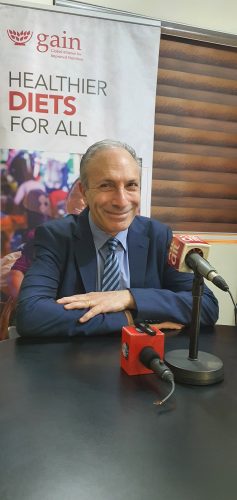An International Non-Government Organisation (NGO), Global Alliance for Improved Nutrition (GAIN), says it has reached over 140 Million Nigerians with fortified affordable, accessible, nutritious food in line with its mission to tackle malnutrition through healthy diets.
READ ALSO:Nasarawa government partners with NGOs to tackle malnutrition
This was disclosed by the Executive Director of Global Alliance for Improved Nutrition (GAIN), Dr. Lawrence Haddad during a media parley with journalists in Abuja, Nigeria’s capital city.
Haddad while pointing out that malnutrition could be reduced through the health system or food system wherein staple foods, grains and oils are fortified with vitamins and minerals, said GAIN is committed to make healthy foods accessible to more people by ensuring that nutritious foods are made more available, affordable and desirable in the global daily competition with junk foods which are mostly tasty, cheap and available.
While affirming that in tackling malnutrition, context drives the portfolio of solutions, Dr Haddad pointed out that Small and Medium Enterprises including small holder farmers, need to be supported with technical assistance, access to finance and building resilience in the value chains to withstand shocks, to enable them grow healthy foods that will scale up nutrition. He added that GAIN was supporting the government through several programmes to transform food systems for healthier diets among citizens.
“…We want everyone to be able to afford healthy diets because healthy diets is at the center of everything malnutrition. Hungry people are angry people and angry people often don’t have enough hope and have nothing to lose, so are very dangerous when it comes to conflict…The government’s first job is to reduce hunger and make sure people do not miss meals, but they don’t have to forget about nutrition in their programmes.
Part of our job is to invest in healthier food because that is investing in the economy 20 years down the road, as well as reducing a whole range of suffering…
Malnutrition is the only condition that physically affects the shape of a human, what you look like and how you function as a human being…We have to make politicians as obsessive about child growth as they are about economy growth.’’ Haddad said.
He further harped on the importance of diversifying food production to ensure vitamins and minerals get to the people in foods they are already eating and can afford,through the market place, schools and safety net programmes. Haddad highlighted the importance of ensuring that value chains are robust and resilient to enable farmers have off takers for surplus products and economic market opportunities in their production, through the reduction of food loss and food wastes. He explicated the need to ensure that that food markets where low income earners source for foods are safe and the import of diversifying foods grown, how they are grown and who grows them as diversification is the insurance.

Re-emphasizing GAIN’s commitment to working with partners in Nigeria to achieve the ambitious goals, Haddad commended the professionalism of Nigeria Journalists and expressed GAIN’s willingness to collaborate with journalists to share information and stories about its work.
He enjoined Media Practitioners to sustain and improve on the existing partnership to scale up nutrition by connecting programmes to policies to drive impacts, simplifying food ideas into everyday languages, building and sustaining stories on food and nutrition insecurity, and charting pathway solutions which will drive home the import of fortified meals readily available in various geographic areas over changing menus in their daily contents.
GAIN Nigeria Country Director, Dr Micheal Ojo, shedding light on the impact of inflation on the rising cost of foods, highlighted the importance of data, in enabling government and other stakeholders implemention of policies that would address malnutrition and improve health. Ojo noted the impacts were far reaching because the fortified foods are produced by business owners, who operate within governments’ policies, rules and regulations.
“Inflation in food prices has to do with policies, supply chain, but they can be addressed. That shows that the food system is critical in bringing down the prices of food and raising the importance in nutrition. Government has already set policy fortification standards, the work we do is to support government regulatory agencies to continue to refine and to enforce those standards and to improve the opportunity for the private sector to comply.” Ojo said.
Ojo further added that over 80 percent of Nigerian farmers are small holder farmers, operating at subsistence level, focus on the production of mono-cropping which is natural to their environment of operation, rather than large scale farming noting that there are opportunities to exploit which would require combination of robust solutions to upscale nutrition in the Country and address the challenges of food insecurity and malnutrition insecurity through the strengthening of the nations’ food chain.
Corroborating, Dr Abbas Yusuf, Deputy Country Director GAIN reiterated the need to support Local Farmers in production, aimed at improving the food systems for healthier diets and addressing malnutrition since 80 percent of the foods consumed in the country come from them.
Head of policy and Advocacy, GAIN Nigeria, Joyce Akpata said if effective policies are put in place and are cascaded to state level, impact would be made.
“We are working to support government to effectively implement the National Pathway to food system transformation that is expected to help align policies beyond sectoral policies.’’
The National Food Consumption and Micronutrient Survey (NFCMS) 2021 report shows that nine out of 10 persons in Nigeria cannot afford healthy diets, while 79 per cent of households in Nigeria are food insecure, while the National Bureau for statistics (NBS) 2022 report indicates that 133 million Nigerians representing 63 percent, live in multi-dimensional poverty.
As the world grapples with rising food insufficiency caused by diverse factors including insecurity, climate change and desertification, GAIN aims to improve the access of 1.5 billion people globally to nutritionally fortified staple foods, healthier diets and positive food systems for all in 10 countries by 2030.


Comments are closed.